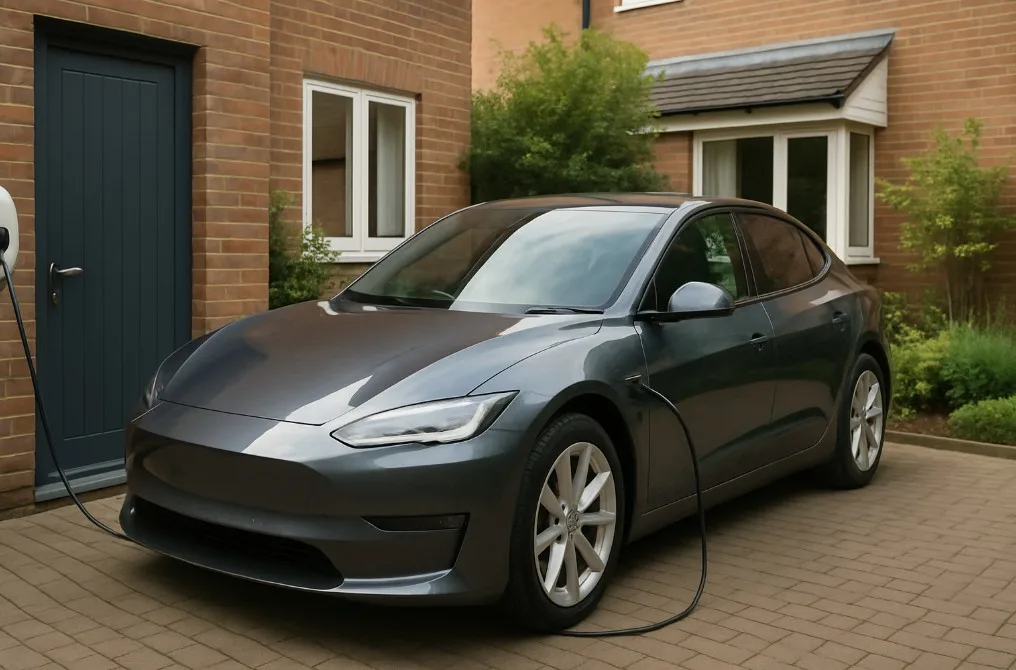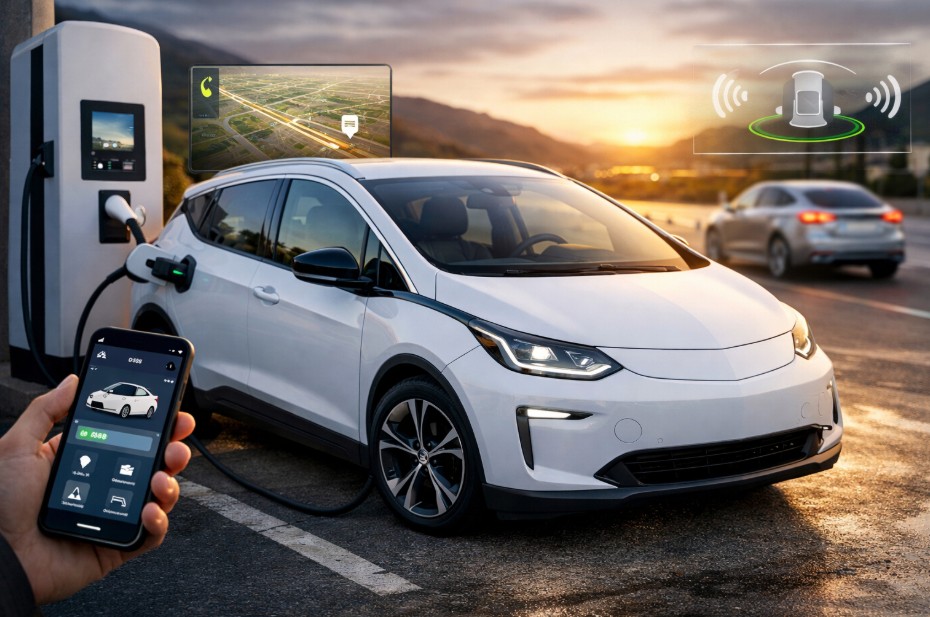Table of Contents
ToggleAs electric vehicles (EVs) become more common on British roads, one of the most frequent questions potential owners ask is: how much does it cost to charge an electric car?
Unlike traditional petrol or diesel vehicles, where prices are clearly displayed on forecourts, the cost of charging an EV varies depending on where, when, and how the car is charged. Factors such as electricity tariffs, battery size, and charging speed all play an important role in determining the final amount.
In the UK, the cost to fully charge an electric car can range from as little as £4 at home to as much as £40 or more at a public ultra-rapid charger. For most drivers, home charging is the most affordable and practical option, while public charging offers convenience when travelling longer distances.
How Much Does It Cost to Charge an Electric Car at Home in the UK?
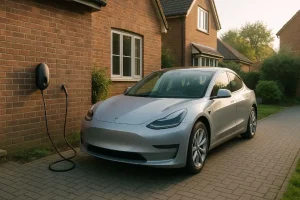
For the majority of EV owners, home charging remains the most economical and convenient solution. A standard home charge typically costs between £4 and £20, depending on the vehicle’s battery size and the electricity tariff.
Those using off-peak or special EV tariffs can benefit from even lower costs sometimes paying the equivalent of 2–3p per mile.
For example, charging a medium-sized electric vehicle with a 60kWh battery on a standard tariff of £0.30 per kWh would cost approximately £18 for a full charge, providing around 250 miles of range.
However, if the same driver used an off-peak tariff such as Octopus Go at £0.09 per kWh, the cost would fall to around £5.40, showing a significant potential saving.
Example Home Charging Costs in the UK
| Battery Capacity | Tariff Type | Cost per kWh | Total Cost (Full Charge) | Approximate Range | Cost per Mile |
| 40kWh | Standard | £0.30 | £12.00 | 150 miles | 8p |
| 60kWh | Standard | £0.30 | £18.00 | 250 miles | 7p |
| 60kWh | Off-Peak | £0.09 | £5.40 | 250 miles | 2p |
| 80kWh | Standard | £0.30 | £24.00 | 300 miles | 8p |
Beyond cost, home charging provides unparalleled convenience. Drivers can plug in overnight, waking up to a fully charged vehicle every morning. Modern home chargers are also smart-enabled, allowing users to schedule charging during cheaper electricity periods automatically.
What Does It Cost to Charge an Electric Car Using Public Charging Stations?
Public charging is essential for drivers who travel long distances or lack access to off-street parking, yet the costs vary considerably depending on the type of charger and provider. Rapid and ultra-rapid chargers are significantly more expensive than home charging but offer the benefit of speed and accessibility.
In most cases, rapid charging stations (typically 50kW–150kW) cost between £7 and £10 to reach around 80% charge, while ultra-rapid chargers (150kW–350kW) can cost 30–70p per kWh, leading to totals between £26 and £40 or more for a full charge.
Charging costs at public locations depend on several elements, including network provider and geographic location. For example, charging a 60kWh vehicle through BP Pulse at £0.65 per kWh would cost about £39, whereas Pod Point at Tesco stores may offer slower charging for free or at rates as low as 44p per kWh.
Public charging is therefore ideal for convenience rather than cost savings. Drivers who rely heavily on public networks could find their running costs approaching those of petrol cars, averaging 13p to 17p per mile.
What Key Factors Influence Electric Car Charging Costs?
Several interrelated factors determine the total cost of charging an electric vehicle in the UK. Understanding these variables can help drivers make informed decisions and optimise their energy spending.
Electricity Tariff:
The cost of electricity is perhaps the single biggest factor affecting EV charging costs. Drivers using standard household tariffs may pay around £0.28–£0.33 per kWh, while those on EV-specific tariffs can pay less than £0.10 per kWh during off-peak hours.
Switching to a dedicated EV tariff can reduce annual charging costs by hundreds of pounds.
Charging Speed:
Faster chargers are more expensive to use because they deliver higher power levels. Slow and fast chargers (up to 22kW) are cheaper but take longer, while rapid and ultra-rapid chargers (50–350kW) are priced higher per kWh due to infrastructure and maintenance costs.
Battery Capacity:
A larger battery, while providing more range, requires more energy to fill. For example, a small hatchback with a 40kWh battery may cost around £12 to charge, whereas a large SUV with an 80kWh battery could cost £24–£40, depending on where and how it’s charged.
Location and Provider:
Costs vary across charging networks and regions. Urban chargers tend to be more expensive than suburban ones, and membership plans offered by networks like Instavolt, BP Pulse, or Osprey can reduce per-kWh costs for frequent users.
Is It More Affordable to Charge at Home or in Public?
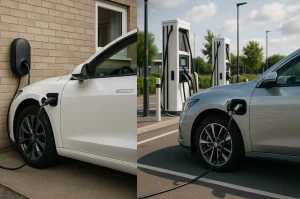
When comparing home and public charging, the financial difference is significant. Home charging, especially on an off-peak EV tariff, is almost always the most cost-effective option.
Average Charging Costs by Location
| Charging Location | Average Full Charge Cost | Average Cost per Mile | Main Advantage |
| Home (EV tariff) | £5–£8 | 2–3p | Cheapest and most convenient |
| Home (standard tariff) | £15–£20 | 7–8p | Consistent and easy to manage |
| Public rapid charging | £7–£10 (80%) | 13–15p | Fast charging while travelling |
| Public ultra-rapid charging | £26–£40+ | 17p+ | Very quick charging time |
Charging at home overnight remains unbeatable for cost efficiency. Public charging is valuable for longer trips or for those without driveways, but the price per mile can easily double or triple that of home electricity.
Can Smart Charging and EV Tariffs Help Reduce Costs?
Yes, adopting smart charging technology and using specialist EV tariffs can substantially reduce energy costs. Smart chargers connect to the internet and automatically choose the cheapest charging times based on live electricity rates or off-peak hours.
Many energy suppliers, such as Octopus Energy, EDF, and Ovo, offer dedicated EV tariffs that provide lower rates for charging during off-peak periods, often between midnight and 5 a.m.
Some also integrate with renewable energy systems like home solar panels, allowing drivers to charge with clean, self-generated electricity.
This combination of smart technology and targeted tariffs not only reduces running costs but also supports the UK’s broader sustainability goals.
Will Electric Car Charging Become Cheaper in the Future?
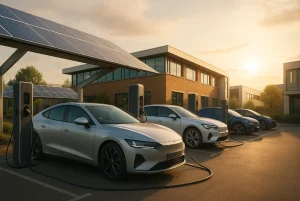
With the UK government’s ongoing investment in clean energy infrastructure and the growth of competition among charging networks, the overall cost of EV charging is expected to decline over time.
As renewable energy capacity expands and battery technology improves, the efficiency of electric vehicles will continue to rise, reducing the amount of electricity required per mile.
In addition, innovations in vehicle-to-grid (V2G) technology may soon allow EV owners to sell unused electricity back to the grid, potentially offsetting charging expenses altogether.
Government incentives and an expanding charging network are likely to keep EV ownership attractive and economically viable for the foreseeable future.
Conclusion – Is Charging an Electric Car Cost-Effective in the UK?
Charging an electric car in the UK is both cost-effective and environmentally friendly, especially when compared with the rising costs of petrol and diesel.
For the average driver, home charging costs typically range between £200 and £400 per year, depending on usage and tariff, while public charging remains a convenient alternative for longer journeys.
Although initial installation of a home charging point and the choice of tariff require some planning, the long-term savings are substantial. As technology advances and renewable energy becomes more widespread, the future of electric vehicle charging promises to be even more efficient and affordable.
FAQs About Electric Car Charging Costs
How much does it cost to charge an electric car overnight at home?
Charging overnight on an off-peak EV tariff generally costs between £4 and £8 for a full charge, depending on the size of the vehicle’s battery and the rate per kWh.
Are public charging points more expensive than home charging?
Yes. Public charging points, particularly ultra-rapid chargers, often cost three to four times more per kWh than home charging, reflecting higher infrastructure and energy costs.
Can drivers reduce costs using smart charging?
Smart chargers enable vehicles to charge during cheaper off-peak periods, saving up to 60% compared with standard tariffs. They also help manage electricity demand more efficiently.
Does battery size affect charging cost?
Yes. Larger batteries require more electricity, meaning vehicles with higher capacity, such as SUVs, will cost more to charge than smaller hatchbacks.
Are there free EV charging stations in the UK?
Some supermarkets, workplaces, and local authorities offer free or discounted charging to encourage EV adoption, though these are generally limited in number.
How long does it take to charge an EV in the UK?
Home chargers typically take 6 to 12 hours for a full charge, while public rapid chargers can reach 80% in around 30 to 60 minutes, depending on power output.
What is the average monthly cost to charge an electric car in the UK?
Most EV owners spend £20 to £40 per month on electricity for charging, depending on their driving habits, battery size, and chosen tariff.

